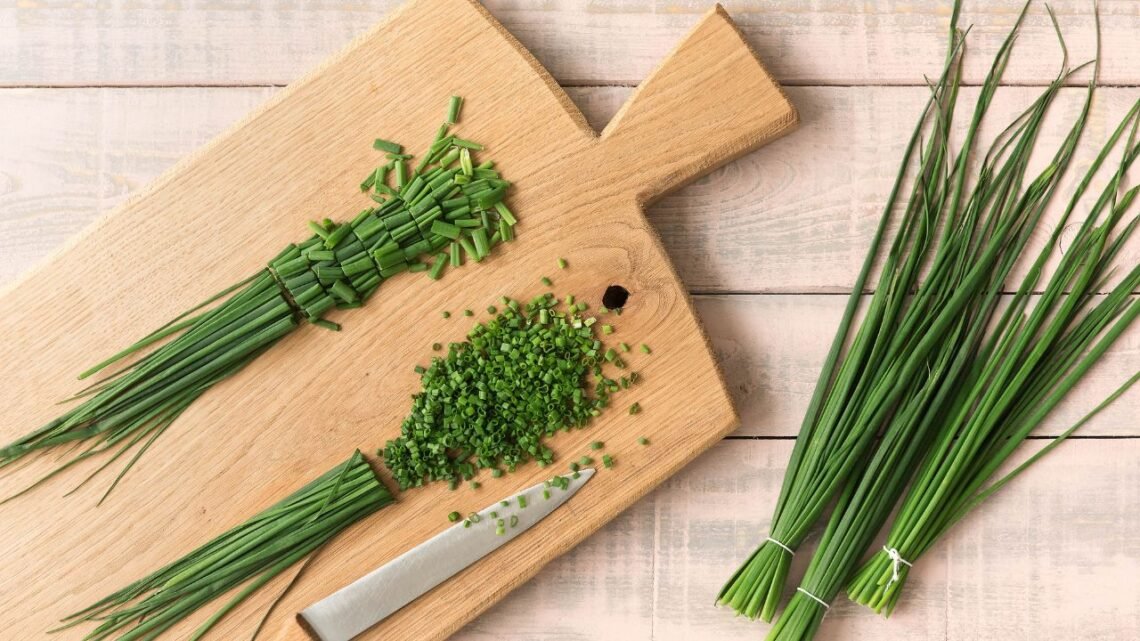Chives can be regarded as a mere garnish to baked potatoes or soups, but there is much more to the great-smelling herb than meets the eye. Chives belong to the allium family; this family has onions, garlic, scallions, and leeks. These have been used since ancient times because of their mild onion flavor with a touch of garlic in addition to their medicinal properties. Some frequently asked questions are: are chives healthy? what are chives good for? and even are there any chives benefits and side effects? The fact is that chives are a nutrition powerhouse and possess amazing health-promoting benefits, which go much further than flavor.
Are Chives Healthy?
The answer to this question is simply yes, chives are so very healthy. Although in most cases they are consumed in small portions, the nutritional value that this tiny herb can hold is astounding. Chives are also an excellent source of vitamins and minerals such as Vitamin A, Vitamin C, Vitamin K, antioxidants and other useful compounds, which positively influence the general health of the body.
Eating them on a regular basis (even in small amounts) can do your body good. Speaking of the benefits of chives, you have to realize that it is not only a garnish, but a functional food that can save your body in numerous ways.
Health Benefits of Chives
The health benefits of chives are wide-ranging, and research suggests that they can help in areas such as immunity, bone health, digestion, and even memory. One of the most talked-about advantages is their potential to help prevent cancer. Chives, like other alliums, contain sulfur compounds and antioxidants that may slow down the spread of harmful cells in the body. Although more research is ongoing, many scientists believe this is one of the most promising chives benefits we know today.
Bone strength is another important health factor. Chives contain Vitamin K that is a significant bone density sustaining factor. Having strong bones is very important in preventing such ailments as osteoporosis and this is supported by incorporating chives into your diet. In addition to this, chives also have choline and folate—two substances that have been identified to help maintain memory and cognitive activity. It implies that, when we pose the question whether chives are good or not, the answer will be even better: they are good to your body and to your mind.
Nutritional Profile of Chives
Even though chives are usually eaten in small amounts, their nutritional impact is worth noting. A single tablespoon of chopped fresh chives provides a surprising punch of vitamins and minerals with almost no calories. This makes them a guilt-free addition to your meals, while still offering substantial health-promoting properties.
Here is a quick breakdown of the nutrition you can get from just one tablespoon of fresh chives:
| Nutrient | Amount per 1 tbsp (fresh) | Health Impact |
| Calories | 1 | Virtually no calories, great for weight control |
| Fat | 0 g | Zero unhealthy fat |
| Sodium | 0 mg | Safe for heart and blood pressure |
| Carbohydrates | 0 g | Easy to include in any diet |
| Protein | 0 g | Light but still nutrient-dense |
| Vitamin A | 1% Daily Value | Supports vision and immune health |
| Vitamin C | 2% Daily Value | Boosts immunity and skin health |
| Vitamin K | Significant amounts | Crucial for bone strength and blood clotting |
| Folate & Choline | Small but important doses | Improve memory and brain function |
This table shows that even in small quantities, the benefits of chives are quite impressive, proving why they should be considered more than just decoration on your plate.
What Are Chives Good For in Daily Life?
If you are still wondering what are chives good for, the answer lies in their versatility. They can support your health while adding flavor and beauty to your meals. Chives are good for boosting immunity because of their Vitamin C content. They are also good for your bones due to Vitamin K, and they help with memory through folate and choline. For people looking to naturally prevent chronic diseases, chives offer antioxidants that fight harmful free radicals in the body.
So, the next time you sprinkle them on your baked potato, remember that you’re not just adding flavor—you’re also adding layers of health. This is why many nutritionists confidently answer yes when asked are chives good for you.
Chives Benefits and Side Effects
Balance is important, as with most foods. Consumed in moderation, the health effects of chives are much more beneficial than harmful. It is, however, on taking in very high amounts that some individuals may experience some stomach pains, bloating, or indigestion. These are not severe problems yet they need to be remembered when listing chives’ advantages and side effects.
Chives are safe and healthy for most people. However, when you have a delicate stomach, then you can consider taking small portions and how your body responds. On the whole, the side effects are few and insignificant in relation to the many benefits.
Are Chives Good for You in Cooking?
Yes, absolutely! Beyond their nutritional value, chives are a wonderful ingredient in cooking. They add a mild, onion-like flavor without overpowering dishes. Their vibrant green color also makes meals look fresh and appealing. Chives can be used raw in salads, mixed into butter, swirled into soups, or sprinkled on top of roasted vegetables. You can even use them in homemade breads, dips, and egg dishes.
Many people also use them as a substitute for green onions or garlic when they want a gentler taste. This means that while you are enjoying the delicious flavor, you are also reaping the benefits of chives without even trying too hard.
How to Add More Chives to Your Diet
Chives can be cultivated in your garden or even in a small pot on your windowsill. They are sustainable, as they can grow in various climates and they come back year by year and They should be picked fresh and placed absolutely right onto your plates to make sure you get the most out of them in terms of flavor and nutritional value. They can be sprinkled onto pasta, mixed into sauces, or cut into homemade dips.
Dried chives do not lose all of their nutrients but still add flavor when fresh are unavailable. Fresh or dried, adding chives more frequently is an easy method of making your meals healthier without forgetting about their delicate taste.
Final Thoughts on the Benefits of Chives
Chives may be small, but their impact is big. From preventing cancer and strengthening bones to improving memory and enhancing digestion, the health benefits of chives make them an essential herb for anyone who wants to live healthier. If you have ever asked are chives healthy, are chives good for you, or what are chives good for, the answer is a strong yes.
Of course, like any food, balance is necessary, and being aware of chives benefits and side effects is wise. But overall, they are a safe, tasty, and nutritious addition to your diet. Next time you see those green sprigs in the garden or at the store, remember that they are more than just garnish—they are a powerful herb that supports your health in many ways.
Read Our More Blogs: Angelica Root: Ancient Herb, Modern Benefits & Its Healing Powers





